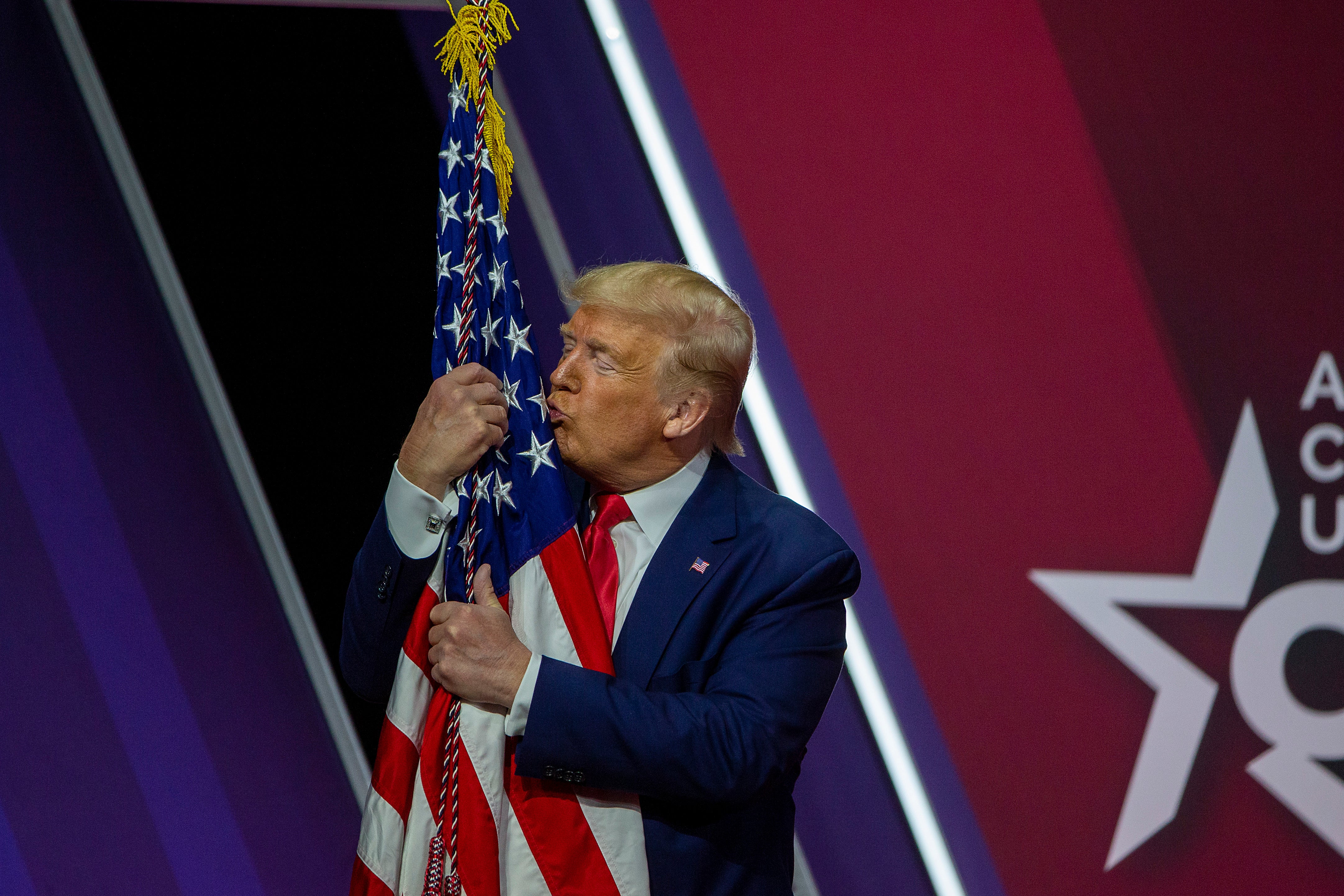CPAC 2021: Trump’s ‘Big Lie’ about 2020 election fraud lives on
Analysis: Annual conservative confab is primed to be a four-day spree of 2020 election denial, writes US political correspondent Griffin Connolly


Your support helps us to tell the story
From reproductive rights to climate change to Big Tech, The Independent is on the ground when the story is developing. Whether it's investigating the financials of Elon Musk's pro-Trump PAC or producing our latest documentary, 'The A Word', which shines a light on the American women fighting for reproductive rights, we know how important it is to parse out the facts from the messaging.
At such a critical moment in US history, we need reporters on the ground. Your donation allows us to keep sending journalists to speak to both sides of the story.
The Independent is trusted by Americans across the entire political spectrum. And unlike many other quality news outlets, we choose not to lock Americans out of our reporting and analysis with paywalls. We believe quality journalism should be available to everyone, paid for by those who can afford it.
Your support makes all the difference.A quick scroll down the 2021 Conservative Political Action Conference (CPAC) agenda presents a pretty clear picture of how the Republican party plans to navigate the post-Donald Trump era: by denying that that era has ended.
Featuring a seven-part series on “Protecting Elections” from voter fraud and a seemingly limitless docket of speeches from and panel discussions with champions of the “stop the steal” movement — including a keynote address from the head honcho himself, Mr Trump — the annual conservative conference is primed to be a four-day spree of 2020 election denial.
Mr Trump, who is slated to deliver his first major speech since leaving the White House at 3.40pm on Sunday, still has not admitted publicly that he lost fair and square last November.
Senator Ted Cruz of Texas will address attendees on Friday in a speech entitled “Bill of Rights, Liberty, and Cancel Culture.” Senator Josh Hawley of Missouri will also deliver remarks.
Mr Cruz and Mr Hawley, if you’ll recall from just a few weeks ago, were the ex-president’s most prominent allies in the upper chamber during the lame duck period throughout which Mr Trump spewed conspiracy theories about outcome-altering voter fraud.
Several other conservative figureheads who promoted Mr Trump’s “Big Lie” about election fraud speckle the speaker list:
- Alabama Congressman Mo Brooks, who will take part in a panel discussion entitled, “Protecting Elections Part 2: Other Culprits: Why Judges & Media Refused to Look at the Evidence.”
- Hans Von Spakovsky, who fiercely advocated against expanding mail-in voting in 2020 and will sit alongside Mr Brooks on the elections panel.
- North Carolina Congressman Madison Cawthorn, the youngest member of the US House who was one of dozens of Republicans to vote against the certification of Joe Biden’s electoral victory on 6 and 7 January but later admitted the election “was not fraudulent.”
The list goes on and on: Donald Trump Jr, Congressman Matt Gaetz, Charlie Kirk, Cleta Mitchell, and more.
Now, to be clear, several notable speakers who did not acquiesce to Mr Trump’s “Stop the Steal” movement will also be speaking at CPAC.
Texas Congressman Chip Roy, a former top aide to Mr Cruz, is participating in a panel discussion on the national debt on Sunday shortly before Mr Trump takes the stage.
Mr Roy defied the majority of House Republicans in the early morning hours of 7 January when he voted to certify Mr Biden’s electoral victory.
He acknowledged in an interview with the Texas Tribune that his vote could serve as his “political death warrant,” but added in the aftermath of the insurrection at the Capitol amid the certification process that Mr Trump “should never have spun up certain Americans to believe something that simply cannot be,” referring to the failed attempt to overturn the election.
Senator Tom Cotton of Arkansas, a longtime Trump ally who has been rather transparently positioning himself for a 2024 presidential run, also rejected the GOP’s attempts to toss out the electoral results. His speech slated for Friday afternoon will focus on “Keeping America Safe,” according to the CPAC schedule.
But even Mr Trump’s fiercest opponents within the Republican party understand that he is above reproach among the vast majority of their voters.
The proverbial battle for the soul of the GOP — if you believe one was ever being waged in the first place — is over.
Mr Trump has won.
Senator Mitt Romney of Utah, the only Republican to vote to convict Mr Trump at both his impeachment trials, confessed on Tuesday in an interview with the New York Times that the former president has “by far the largest voice and a big impact” in the GOP.
“I expect he will continue playing a role. I don’t know if he’ll run in 2024 or not. But if he does, I’m pretty sure he will win the nomination,” Mr Romney said, highlighting early polling that shows Mr Trump lapping the prospective GOP field in 2024.
Republicans, split internally on how much to rely on Mr Trump as a kingmaker in elections moving forward, are banding together in Washington as a united front to Democratic control of Congress and the White House.
Lingering differences over Mr Trump, though, have produced some awkward moments.
Republican Congresswoman Liz Cheney and House Minority Leader Kevin McCarthy had such an incident on Capitol Hill on Wednesday when they were both asked whether Mr Trump should be CPAC’s featured speaker.
“Yes, he should,” Mr McCarthy promptly responded.
When the reporter turned to Ms Cheney — the House GOP Conference chairwoman and one of 10 Republicans who voted to impeach Mr Trump in January — she struck the opposite position.
“That’s up to CPAC,” Ms Cheney said, before continuing. “I’ve been clear on my views about President Trump and the extent to which, following January 6, I don’t believe that he should be playing a role in the future of the party or the country.”
A tense brief silence ensued before a smile appeared on Mr McCarthy’s lips.
“On that high note,” he cracked to laughter from the gathered press, “thank you all very much.”





Join our commenting forum
Join thought-provoking conversations, follow other Independent readers and see their replies
Comments